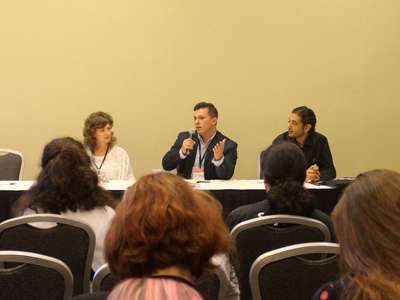Whoever Is Free from Conflicts of Interest, Let Them Throw the First Stone!

Speakers in the “Conflicts of Interest for Freelance Science Journalists” session (l-r): Brooke Borel, Federico Kukso, Mohammed Yahia. Photo: Jesús Antonio Pascual Álvarez.
By Jesús Antonio Pascual Álvarez
SAN FRANCISCO—There is a simple truth in the news business: Audiences want to consume verified information from credible media, and journalists strive to gain that trust.
But things are often not that simple, because there always seems to exist a third party intent on bending the message in favor of their economic, ideological or political interests.
Freelance journalists know this conflict of interest is undesirable and can negatively affect their coverage, but sometimes it is impossible to get rid of it. An international panel of science writers discussed these issues on 26 October at the World Conference of Science Journalists 2017.
Working conditions for freelancers, often characterized by a lack of resources and support from their employers in the media, can undermine their ethical choices.
Although this is a global problem, it is not quite the same in the United States, Argentina or the Middle East. Cultural and social differences matter. Three journalists gave their perspectives on these issues in a session titled “Conflicts of Interest for Freelance Science Journalists.”
Regional differences
According to the Code of Ethics of the Society of Professional Journalists in the U.S., those who practice journalism should avoid conflicts of interest such as accepting gifts, favors, fees, free travel and other special deals.
All journalists have lived these experiences. Sometimes companies, institutions or associations try to nudge them into telling stories with a convenient bias, or even turn them into thinly veiled advertising.
Brooke Borel, who has published in Nature, The Guardian and The Atlantic, among others, addressed the situation in the U.S. In her view, avoiding conflicts of interest is a prerequisite for quality in journalism.
This case is not as clear in Latin America. Federico Kukso, a freelance science journalist in Argentina, said the biggest problem facing Latin American journalists is economic. It is not common to get funding for international coverage, which increases the temptation to accept it from companies or governments with vested interests.
Disclosure, lost in translation
Kukso noted there is no Spanish translation for “full disclosure” as a concept. In this context, journalists seldom feel compelled to clarify their sponsors.
“It is important to increase professional and intellectual honesty, to inform [editors] if a company paid for the trip,” Kukso said. “We have to be honest because the credibility of journalism is our main value.”
Mohammed Yahia, executive editor of the journal Nature in the Middle East, said the situation of journalists in Latin America is similar to that of their colleagues in Africa and the Middle East. They feel unsure regarding conflicts of interest and, at the same time, do not have enough money to report from faraway places.
The bottom line: When in doubt, disclose.
This issue is not new. At the National Association of Science Writers meeting in October 2015 in Cambridge, Massachusetts, speakers advised caution against conflicts of interest, because many publishers will reject an article if an institution or company financed it.
Borel provided final advice to her colleagues. To avoid conflicts of interests, she said, expand your portfolio of clients to guarantee a proper income. Most importantly, she noted, be forthcoming with your editors regarding potential conflicts.
The bottom line, said Borel: When in doubt, disclose.
—
Jesús Antonio Pascual Álvarez received a degree in communication from the Universidad Juárez Autónoma de Tabasco, Mexico. He worked at the Science and Technology Council of the State of Tabasco, and he plans to use science journalism to help the citizens of his state make better decisions.
